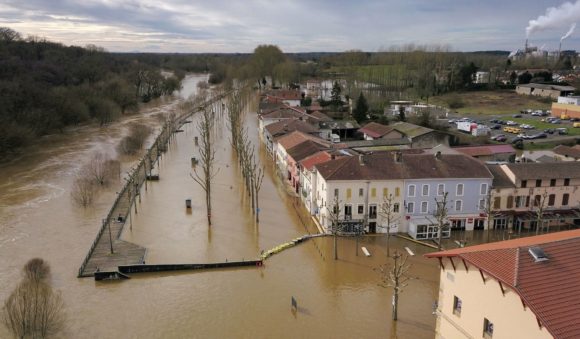The European Union is bolstering its 14-trillion-euro ($17 trillion) economy against damage caused by the impacts of climate change, from droughts to floods and forest loss.
Under an updated climate adaptation strategy unveiled Wednesday, the European Commission is calling for efforts such as better use of climate-risk data, smarter damage prevention and increased insurance coverage. It’s part of the EU’s environmental overhaul called the Green Deal.
Even as the 27-nation EU aims to neutralize greenhouse-gas emissions by 2050, the consequences of global warming pose threats to the region’s power grids, farms, cities and human health. The economic losses for increasingly frequent extreme weather events are more than 12 billion euros per year on average, according to the commission, the EU’s executive arm.
“There’s not going to be a successful Green Deal, there’s not going to be climate neutrality in 2050 without a consistent effort into adaptation and mitigation,” said Frans Timmermans, the commission’s executive vice-president.
The new, more ambitious adaptation plan encourages better use of data on climate-related risks, stepping up planning to prevent damages and incorporating climate risks into financial frameworks. It also aims to close the so-called climate protection gap, or the share of non-insured economic losses.
Only 35% of the climate-linked economic losses are insured on average, according to the commission. The proportion is as low as 5% in southern and eastern Europe.
Extreme weather events, such as forest fires and heatwaves in the Arctic Circle, droughts in the south and flooding and forest loss in central and eastern Europe, are already having far-reaching effects on the European economy. Total insurance losses for weather-related events amounted to 0.1% of gross domestic product in 2018 and are likely to rise.
“More different and more tailored policies in all member states I think will help us minimize economic losses,” Timmermans said. “This is very, very important and for that we need the insurance sector. Adaptation efforts could be promoted through reduced premiums or the insurance of nature-based solutions.”
Photograph: View of the flooded city of Tartas, Landes, southwest of France. Photo credit: Mehdi Fedouah/AFP/Getty Images
Was this article valuable?
Here are more articles you may enjoy.



 Carnival Puts Miami Headquarters Up for Sale as Florida Real Estate Soars
Carnival Puts Miami Headquarters Up for Sale as Florida Real Estate Soars  Vintage Ferrari Owners’ Favorite Mechanic Charged With Theft, Fraud
Vintage Ferrari Owners’ Favorite Mechanic Charged With Theft, Fraud  USAA to Lay Off 220 Employees
USAA to Lay Off 220 Employees  Viewpoint: Florida Insurance Market on the Mend
Viewpoint: Florida Insurance Market on the Mend 

